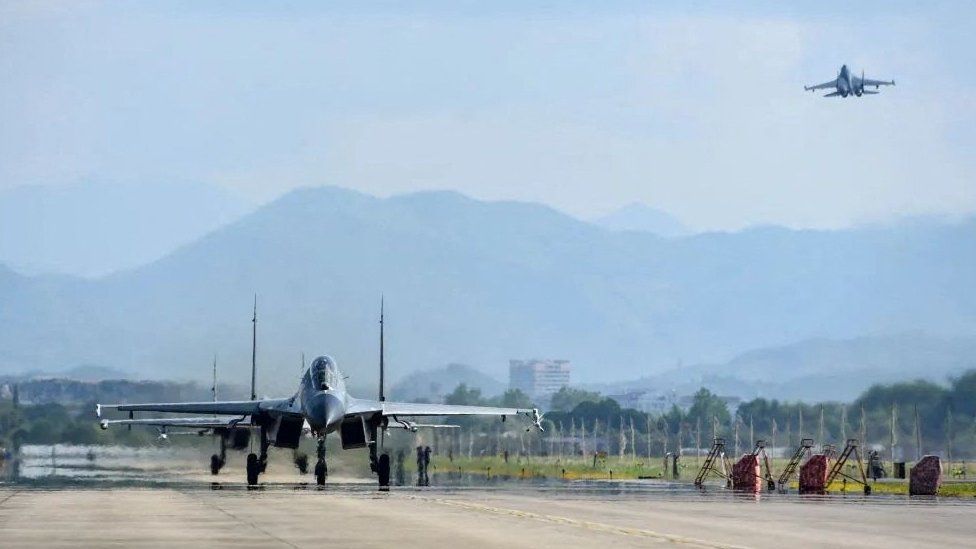ARTICLE AD BOX
By Sam Cabral
in Washington
 Image source, Handout
Image source, Handout
Beijing is currently holding military drills in the air and seas around Taiwan
China is halting co-operation with the US in several key areas including climate change, military talks and efforts to combat international crime.
The new measures follow a trip to Taiwan by a US congressional delegation led by senior Democrat Nancy Pelosi.
China, which also announced it was sanctioning Ms Pelosi and her family, views the visit as a challenge to its claims of sovereignty over Taiwan.
The self-ruled island sees itself as distinct from the mainland.
The measures were announced by China's foreign ministry on Friday. It said dialogue between US and Chinese defence officials would be cancelled, while co-operation on returning illegal immigrants, climate change, and investigating international crime would be suspended.
The two superpowers have maintained cordial diplomatic ties on the need to combat climate change in recent years. At last year's climate summit in Glasgow, China vowed to work "with urgency" with the US to cut emissions.
The countries have also found rare common cause on efforts to fight the trade of illegal drugs such as fentanyl.
The decision to halt co-operation was taken because Ms Pelosi visited Taiwan "in disregard of China's strong opposition and serious representations," the ministry said in a statement.
It also accused the US delegation and Ms Pelosi - who is the highest-ranking US politician to travel to the island in 25 years - of "egregious provocations".
Although the US does not officially recognise Taiwan, Washington maintains a strong relationship with the island - which includes selling weapons for Taiwan to defend itself.
Ms Pelosi is currently in Japan on the final leg of an Asia tour, and said on Friday that China "will not isolate Taiwan by preventing us to travel there".
Speaking to the BBC, Taiwan's Foreign Minister Joseph Wu defended the visit which he said would "raise the profile of Taiwan and... allow the international community to understand that Taiwan is a democracy".
He also condemned the large-scale military exercises that China began around the island on Thursday.
Foreign minister, Joseph Wu, condemns China's military drills around Taiwan
Beijing is currently holding military drills in the air and seas around the island and these are expected to continue until Sunday.
More than 100 warplanes and 10 warships have taken part in the live-fire exercises, with many apparently crossing the unofficial buffer zone between China and Taiwan.
At least one ballistic missile has flown directly over the island, according to Chinese state media.
Taiwan's foreign ministry has not confirmed or denied whether that is true, but it condemned the ongoing drills as "highly provocative acts".
US Secretary of State Antony Blinken added on Friday that there was "no justification for this extreme, disproportionate and escalatory military response".
"China has chosen to overreact and use Speaker Pelosi's visit as a pretext to increase provocative military activity in and around the Taiwan Strait," he said.
China and Taiwan: The basics
- Why do China and Taiwan have poor relations? China sees the self-ruled island as a part of its territory and insists it should be unified with the mainland, by force if necessary
- How is Taiwan governed? The island has its own constitution, democratically elected leaders, and about 300,000 active troops in its armed forces
- Who recognises Taiwan? Only a few countries recognise Taiwan. Most recognise the Chinese government in Beijing instead. The US has no official ties with Taiwan but does have a law which requires it to provide the island with the means to defend itself

 2 years ago
47
2 years ago
47








 English (US) ·
English (US) ·